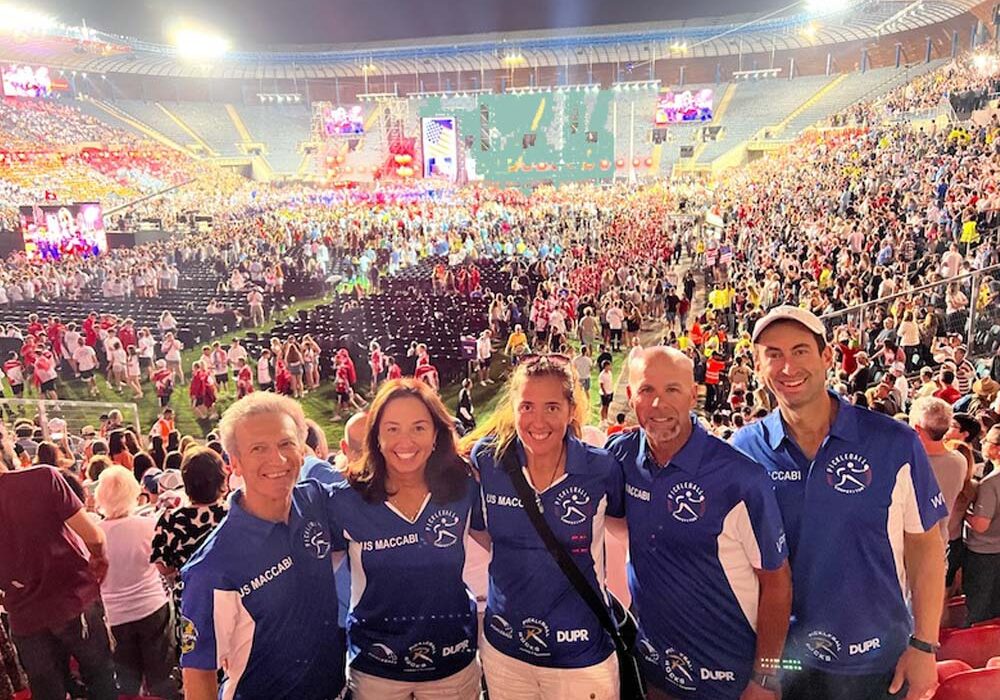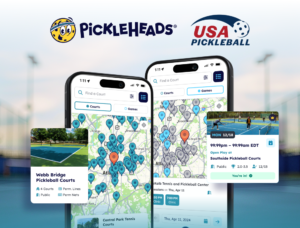Pickleball Makes Maccabi Games Debut
U.S. ambassadors set upon quest to spread love of game
By Drew Wathey
In what many consider a major steppingstone in the evolution of the sport, a United States pickleball delegation made its way this summer to Israel for the Maccabi Games, one of the largest events in international athletics.
Affectionately known as the “Jewish Olympics,” the Maccabi Games features nearly 60 countries participating in 42 sports. Its field of 10,000 athletes is surpassed only by the Summer Olympic Games and soccer’s FIFA World Cup. Led by one of pickleball’s most ardent ambassadors, Seymour Rifkind, the U.S. contingent—composed of seven open pros, senior pros and executives—showcased pickleball as an official exhibition sport in four locales throughout the region.
“Rif is a force of nature. I’ve never met anyone as passionate about spreading the love of the game like he does,” said Brian Levine, a high-level senior singles pro who helped debut the sport at the 21st Maccabi Games. “And by the way, despite being in his 70s, he still has some tremendous pickle game!”
A force of nature may be an understatement when describing Rifkind, president and founder of the World Pickleball Foundation, the International Pickleball Teaching Professional Association and the Pickleball Hall of Fame. An unending commitment to pickleball’s global growth is what drives Rifkind, a former elite gymnast who competed and medaled at the Maccabi Games in 1969.
“Everyone can learn to dink the ball back and forth, and this gives everyone the joy of success. It’s suitable for a five-year-old or 85-year-old, so all ages can truly play a sport for life,” said Rifkind, who once finished one of the most difficult races in the world, the Badwater 135, a 135-mile run that starts in Death Valley and ascends 14,600 feet. “The game itself has so many unique characteristics: soft touch, patience, strategy along with power, speed and quick reflexes. Two extremes, and at the higher level you need all of it to be successful. So easy to learn, yet so hard to master.”
In addition to Levine, USA Pickleball President Robert Quicksilver, DUPR CEO Jill Braverman, Scott Fliegelman, Susie Leblang and Megan Hall all joined Rifkind on what he called a “10-day trip of a lifetime.”
“Although we introduced pickleball to many adults while in Israel, we had the opportunity to teach hundreds of children who loved it,” said Hall, who runs the pickleball social media platform Today in Pickleball. “We all had special moments with the kids that we enjoyed very much. They wanted to know how they could keep playing when we left.”
“The highlight for me was playing with the Israeli children and teenagers,” said Quicksilver. “Witnessing the joy on their faces as they got to play a new sport and hit with the U.S. delegation was very special.”
The group arrived in Israel three days early in mid-July to experience the country and tour historical and religious sites, such as the Wailing Wall, while bonding as a group. They played a full week of pickleball spread between the cities of Tel Aviv, Jerusalem, Haifa and Ramat Hasharon Each stop consisted of an exhibition followed by clinics at an Israel Tennis & Education Center in the morning and then neighborhood parks in the afternoon.
Thanks to The Kitchen Dink, the U.S. team quickly became fan favorites by handing out PICKLE T-shirts spelled in Hebrew.
“It was remarkable how our games attracted everyone from around the facilities we played at. The longer we played, the more people would show up to play with us. The fun emanating from our courts was contagious,” Levine said. “It was generally organized for the kids who were at the tennis summer camps, so they picked it up quickly. But since we were playing at the tennis stadiums where they were staging the Maccabi tennis events, the tennis competitors would ask to join in, too.”
“The reaction was overwhelmingly positive,” said Quicksilver, who oversees the Board of Directors for USA Pickleball which, in its role as the National Governing Body, directly supported the trip. “The children and adults couldn’t wait to get on the court and play with the members of the U.S. team. When they experienced how relatively easy pickleball is to pick-up and how quickly they could enjoy playing it, they didn’t want to stop.”
The group taught top junior tennis players from Argentina, Spain and Mexico how to play pickleball, and according to Hall, they “became very good, very quickly.”
Those on the trip praised Rifkind’s laser focus on the sport and what needs to be done to take the game to the next level.
“I feel fortunate to have spent a very special time with incredible people in pickleball on this trip, especially Rif,” Hall added. “Rif is a warmhearted, no-nonsense type of person who is not only talking about growing pickleball but also implementing what everyone says should be happening around the world to grow the sport. He has created an international organization for coaches to have credentials and to set a worldwide standard of what that should look like. I have come to know him well, and to know him is to love him.”
This was not Rifkind’s first goodwill tour to Israel. He also traveled there in 2017—replete with four nets, 25 paddles and several hundred balls—to introduce the sport of pickleball. He conducted exhibitions at four tennis centers and met with Maccabi Games management to initially pitch inclusion in the event.
“I continued to work with the Israel Tennis & Education Centers (ITEC) to promote pickleball and take the steps necessary to get pickleball represented,” Rifkind said. Today pickleball is in about half of the 15 ITEC facilities across the country. “This past January, I received the official letter that pickleball would be accepted as an exhibition sport.”
His global travels have endeared the game to so many and for Rifkind—who was recently featured in a 25-minute documentary entitled Dinking Across Faith—it means his never-ending quest for pickleball acceptance worldwide is gaining ground.
“Pickleball was accepted at the Maccabi Games in the same manner that I’ve experienced in 20 other countries. Young or old, smiles and laughter and immediate friendships occur through this great game. It brings together people from different race and religion,” he added. “Having athletes from other sports who were competing in their respective events was amazing. Soccer players, tennis and volleyball players from other countries came out and were immediately engaged and in love with the game. Much of this can be attributed to (our) delegation of players. Each one of them was absolutely amazing. (Now) somebody has to carry the torch when we leave.”





